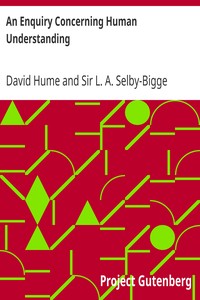| Author |
Hume, David, 1711-1776 |
| Editor |
Selby-Bigge, L. A. (Lewis Amherst), Sir, 1860-1951 |
| Title |
An Enquiry Concerning Human Understanding
|
| Note |
Reading ease score: 47.8 (College-level). Difficult to read.
|
| Note |
Wikipedia page about this book: https://en.wikipedia.org/wiki/An_Enquiry_Concerning_Human_Understanding
|
| Credits |
Produced by Jonathan Ingram and Project Gutenberg
Distributed Proofreaders
|
| Summary |
"An Enquiry Concerning Human Understanding" by David Hume is a philosophical treatise written during the early 18th century. The work explores the nature of human cognition, the limitations of human reason, and the principles underlying human understanding. Hume delves into important topics such as the origin of ideas, the relationship between causes and effects, the nature of belief, and the principles of association within our thoughts. The opening of Hume's inquiry begins by distinguishing between two different types of philosophy, namely moral philosophy and a more analytical approach to understanding human nature. He outlines the merits of both, acknowledging that while the former aims to guide virtuous behavior through sentiment and understanding, the latter seeks to dissect and analyze the underlying principles that govern human cognition. Hume emphasizes that this analytical philosophy, while potentially more abstract and difficult to grasp, is essential for understanding the foundation of our beliefs and actions. He introduces the tension between practical and abstract reasoning, setting the stage for a deeper exploration of how humans perceive and process their experiences. (This is an automatically generated summary.)
|
| Language |
English |
| LoC Class |
B: Philosophy, Psychology, Religion
|
| Subject |
Ethics
|
| Subject |
Knowledge, Theory of
|
| Category |
Text |
| EBook-No. |
9662 |
| Release Date |
Jan 1, 2006 |
| Most Recently Updated |
Jan 30, 2021 |
| Copyright Status |
Public domain in the USA. |
| Downloads |
5102 downloads in the last 30 days. |
|
Project Gutenberg eBooks are always free!
|

